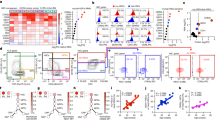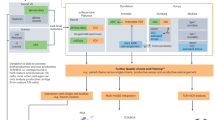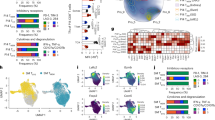Abstract
VIRUS-infected cells can be eliminated by cytotoxic T lymphocytes (CTL), which recognize virus-derived peptides bound to major histocompatibility complex (MHC) class I molecules on the cell surface1,2. Until now, this notion has relied on overwhelming but indirect evidence, as the existence of naturally processed viral peptides has not been previously reported. Here we show that such peptides can be extracted from virus-infected cells by acid elution. Both the naturally processed H–2-Db-restricted and H–2-Kd-restricted peptides from influenza nucleoprotein are smaller than the corresponding synthetic peptides, which have first been used to determine the respective CTL epitopes1,3. As with minor histocompatibility antigens4, occurrence of viral peptides seems to be heavily dependent on MHC class I molecules, because infected H–2d cells do not contain the H–2-Db-restricted peptide, and infected H–2b cells do not contain the H–2-Kd-restricted peptide. Our data provide direct experimental proof for the above notion on MHC-associated viral peptides on virus-infected cells.
This is a preview of subscription content, access via your institution
Access options
Subscribe to this journal
Receive 51 print issues and online access
$199.00 per year
only $3.90 per issue
Buy this article
- Purchase on Springer Link
- Instant access to full article PDF
Prices may be subject to local taxes which are calculated during checkout
Similar content being viewed by others
References
Townsend, A. R. et al. Cell 44, 959–968 (1986).
Bjorkman, P. J. et al. Nature 329, 506–512 (1987).
Taylor, P. M., Davey, J., Howland, K., Rothbard, J. B. & Askonas, B. A. Immunogenetics 26, 267–272 (1987).
Falk, K., Rötzschke, O. & Rammensee, H.-G. Nature 348, 248–251 (1990).
Rötzschke, O., Falk, K., Wallny, H.-J., Faath, S. & Rammensee, H.-G. Science 249, 283–287 (1990).
Bodmer, H. C., Pemberton, R. M., Rothbard, J. B. & Askonas, B. A. Cell 52, 253–258 (1988).
Gould, K., Cossins, J., Bastin, J., Brownlee, G. G. & Townsend, A. J. exp. Med. 170, 1051–1056 (1989).
Deres, K., Schild, H., Wiesmüller, K.-H., Jung, G. & Rammensee, H.-G. Nature 342, 516–564 (1989).
Aichele, P., Hengartner, H., Zinkernagel, R. M. & Schulz, M. J. exp. Med. 171, 1815–1820 (1990).
Wraith, D. C., Smilek, D. E., Mitchell, D. J., Steinman, L. & McDevitt, H. O. Cell 59, 247–255 (1989).
Van Pel, A., De Plaen, E. & Boon, T. Somatic Cell molec. Genet. 11, 467–475 (1985).
Schnorrenberg, G. & Gerhardt, H. Tetrahedron 45, 7759–7764 (1989).
Author information
Authors and Affiliations
Rights and permissions
About this article
Cite this article
Rötzschke, O., Falk, K., Deres, K. et al. Isolation and analysis of naturally processed viral peptides as recognized by cytotoxic T cells. Nature 348, 252–254 (1990). https://doi.org/10.1038/348252a0
Received:
Accepted:
Issue Date:
DOI: https://doi.org/10.1038/348252a0
This article is cited by
-
Uncovering novel MHC alleles from RNA-Seq data: expanding the spectrum of MHC class I alleles in sheep
BMC Genomic Data (2023)
-
Antigen presentation in cancer — mechanisms and clinical implications for immunotherapy
Nature Reviews Clinical Oncology (2023)
-
Highly conserved, non-human-like, and cross-reactive SARS-CoV-2 T cell epitopes for COVID-19 vaccine design and validation
npj Vaccines (2021)
-
In vivo detection of antigen-specific CD8+ T cells by immuno-positron emission tomography
Nature Methods (2020)
-
Mass spectrometry–based identification of MHC-bound peptides for immunopeptidomics
Nature Protocols (2019)
Comments
By submitting a comment you agree to abide by our Terms and Community Guidelines. If you find something abusive or that does not comply with our terms or guidelines please flag it as inappropriate.



